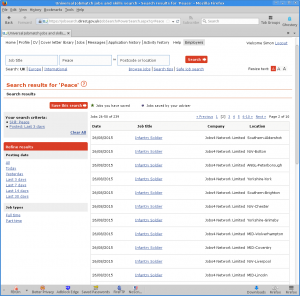After my experience this past academic year, there is no way I am doing more than 60 credits at once at Level 3, that is, full-time study while working. The year saved is not worth the stress, the loss of value-for-money from skipping material, the lost opportunity from not having time to read around the subject nor the impact on the grade. And at Open University Level 3, it’s all about the grade since that is most of the final grade weighting.
I was going to do A333 Key questions in philosophy but my experience of A222 Exploring philosophy has put me off. It was not what I thought it would be.
I had also planned to do DD301 Crime and justice as it includes ‘trans-national policing, international criminal courts and universal human rights‘ but those are only a minor part of the syllabus. Also, it is intended for those going into ‘crime prevention and conflict resolution‘ (amongst other things) and my desired career is in conflict prevention. Similar, but not the same thing. I’ll need to have another think.
I downloaded the list of all the 107 Level 3 modules available to me and went through each module in turn, deciding afresh if I wanted or needed to do it. A day’s work turned that into a shortlist of 12.
So many things to consider:
- When does the module first run? (DD317 Advanced Social Psychology should have started this October but will be October 2017 and DD311 Crime, harm and the state in October 2019 which is one year too late for me to do it.)
- When does the module cease to be available?
- 30 credits or 60 credits?
- Does it have an exam?
- Is there team work? (No thank you. I’ve carried others before, and discovered you don’t get any thanks for doing so. A shame, as that has put me off S382 Astrophysics which I really fancied.)
- Will it help my career?
- I only have 120 credits left (or 150 if I’m devious and willing to add another year by doing 30, then 60 then 60).
- Which 60 credits I want locked into the 300 credits that make up the open (non-honours) component. (What a weird rule.)
- Whether I want a name degree (that was a realistic option until A222 put me off philosophy).
- Will I enjoy it? (I can’t excel at something I do not enjoy.)
- Ought I to do it for my career? (Peace Studies.)
- Will I learn something useful?
I really fancy S350 Evaluating contemporary science as it would be interesting, challenging and probably very useful to me. One is expected to research, produce and present a scientific paper as practice for being a real scientist! I could do something on sensor reliability in unmanned ground vehicles (or autonomous fighting machines, multi-function utility vehicle, warbots, kill-bots, autonomous drones, call ’em what you will) or the environmental impact of war in an oil-producing region.
But, it is 30 credits and I have talked myself out of the other 30 credit modules. I’ll re-consider it this time next year.
I think I have settled on which one to do next, A327 Europe 1914-1989: war, peace, modernity, mostly because it will look relevant on a Master’s Degree application and because it ought to be relatively easy for me. I’ve been informally studying war and how & why it happens for decades, so those parts ought not to be too alien. However, although the title sounds relevant, I’m not terribly interested in war in history as a subject of study because that has changed nothing. My interest is evidence-based peace process research. But, I shall use it as a corridor of doorways to other paths to study.
Risk: what will be new to me is that it is a history module and I’ve never done one of those. I wonder what new skills and methods I will need for that.
I’ve bought and downloaded the A327 exam paper for 2015 and it asks for “Write a commentary on the following primary source extract…” but I do not know what a ‘commentary’ looks like. It also says “Answer the following thematic question…” but what is a thematic question and what is special about how one answers one?
I have asked those queries on the Arts & Humanities forum and I hope somebody understands. I should probably ask it on the Open Degree forum – the polymathic folk there might understand my concern better.
Meanwhile I can do advance reading by getting the set book and by going through the OpenLearn material that has been produced based on this very module.

